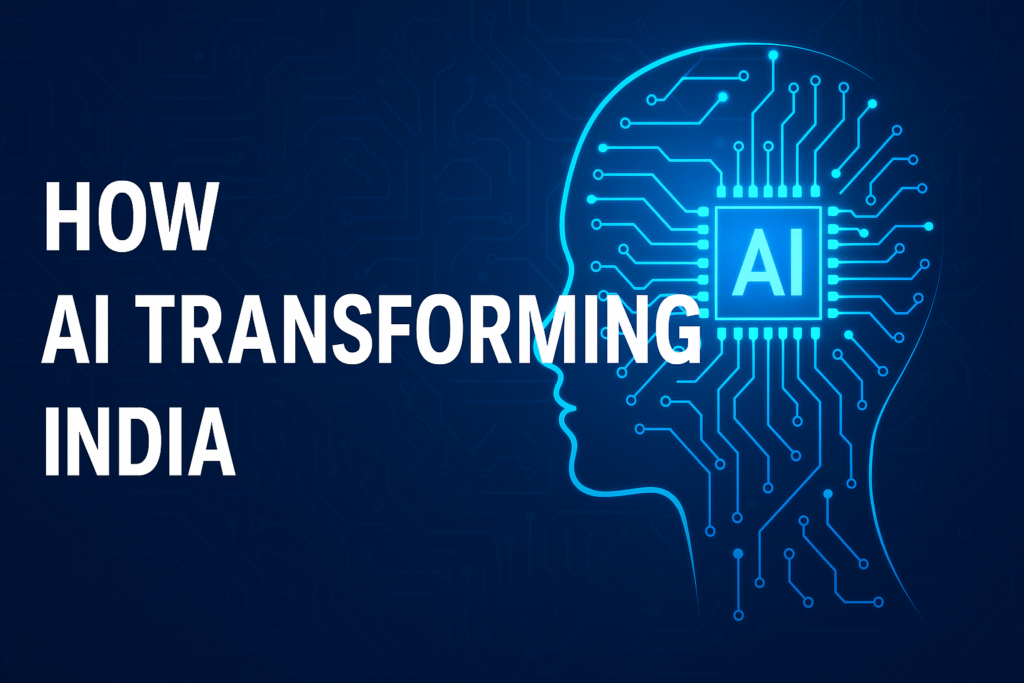Artificial Intelligence (AI) is no longer a futuristic concept—it has become a driving force in transforming economies, industries, and societies across the globe. In recent years, India has emerged as one of the fastest-growing hubs for AI adoption. From healthcare and agriculture to education and governance, AI is reshaping how India works, learns, and grows. This article explores how AI is transforming India in 2025 and beyond, highlighting opportunities, challenges, and the road ahead.
Why AI is Critical for India’s Growth
India is home to the world’s largest youth population, a rapidly digitizing economy, and a thriving startup ecosystem. With initiatives like Digital India and Make in India, the nation is investing heavily in technological advancement. AI is playing a central role by:
- Boosting efficiency in industries like manufacturing, logistics, and banking.
- Driving innovation in startups, enabling cost-effective and scalable solutions.
- Creating jobs in AI research, development, and implementation.
- Improving governance through data-driven decision-making.
According to a PwC report, AI has the potential to contribute over $15 trillion to the global economy by 2030, and India aims to capture a significant share of this growth.
Major Sectors Where AI is Transforming India
1. AI in Healthcare
Healthcare in India faces challenges such as accessibility, affordability, and quality of service. AI is solving these through:
- Diagnostics: AI-powered tools like Qure.ai help in early detection of diseases like tuberculosis and cancer.
- Telemedicine: Virtual AI doctors and chatbots provide rural populations access to primary care.
- Drug discovery: AI speeds up research for vaccines and medicines.
- Predictive analytics: Hospitals use AI to forecast patient needs and manage resources efficiently.
Related Post: How Telemedicine is Changing Rural Healthcare in India
2. AI in Agriculture
Agriculture employs more than 40% of India’s workforce, yet farmers often face losses due to unpredictable weather and low yields. AI is helping by:
- Crop monitoring using drones and satellite imagery.
- Precision farming with AI-based soil analysis.
- Market prediction for better pricing and reduced middlemen exploitation.
- Smart irrigation systems saving water while increasing output.
For example, Microsoft’s AI for Agriculture initiative in India helps farmers get weather updates and crop advisories.
External Source: NITI Aayog’s AI Strategy Report
3. AI in Education
With over 1.5 million schools and 250 million students, education in India is a massive sector where AI is making an impact:
- Personalized learning platforms adapt content to individual students.
- AI tutors and chatbots assist students after school hours.
- Automated grading systems reduce teachers’ workload.
- Language translation tools break barriers for rural students.
Platforms like BYJU’S and Vedantu are already using AI to enhance student engagement and learning outcomes.
4. AI in Governance & Public Services
The Indian government is actively adopting AI to improve governance:
- Smart Cities: AI-powered traffic management and surveillance.
- Digital assistants: AI chatbots for government services (e.g., IRCTC’s chatbot AskDISHA).
- Welfare schemes: AI helps track and prevent fraud in subsidy distribution.
- Judicial system: AI tools for case law analysis to reduce case backlogs.
Related Post: Digital India – The Road to a Tech-Driven Nation
5. AI in Business & Startups
India’s startup ecosystem is booming with over 100 unicorns, and AI is a big enabler:
- Fintech: Fraud detection and loan approvals using AI.
- Retail & E-commerce: Personalized product recommendations.
- Customer support: Chatbots reduce service costs.
- Manufacturing: AI-powered robots streamline production.
Startups like Haptik, Mad Street Den, and Niki.ai are examples of how India is leveraging AI for innovation.
AI and Job Creation in India
One of the most debated topics around AI is its impact on jobs. While automation may replace certain repetitive roles, AI is also creating entirely new career paths.
- High-skill jobs: AI engineers, data scientists, ML researchers, and robotics specialists are in high demand.
- AI management roles: Businesses need experts who can integrate AI into strategy.
- Reskilling opportunities: Platforms like Skill India and Coursera are training millions in AI-related skills.
- New industries: AI is fueling growth in autonomous vehicles, cybersecurity, and smart devices.
A World Economic Forum report predicts that while some jobs will be lost to automation, AI will create 97 million new roles globally by 2030—many of which India is well-positioned to fill.
Ethical and Social Dimensions of AI in India
As AI adoption grows, ethical concerns are becoming increasingly important:
- Data privacy: With massive data collection, ensuring user privacy is critical.
- Bias in AI models: AI trained on biased data can reinforce inequality.
- Job displacement: Low-skill workers in industries like textiles and logistics may be at risk.
- Surveillance: AI-based facial recognition in public spaces raises questions of freedom and rights.
To address this, India needs strong AI ethics guidelines. NITI Aayog and MeitY (Ministry of Electronics and IT) are already working on Responsible AI frameworks.
AI for Rural India: Bridging the Digital Divide
AI’s true potential lies in empowering rural India, where more than 65% of the population lives. Some ways AI is bridging the gap:
- Agriculture: Predictive weather tools help farmers reduce crop loss.
- Education: AI-powered learning apps reach remote students.
- Healthcare: AI-driven telemedicine is improving access in villages.
- Financial inclusion: AI-driven fintech apps make banking accessible to the unbanked population.
If AI is implemented inclusively, it can become a powerful tool for social empowerment in India.
Global Positioning: India as an AI Powerhouse
India is not just adopting AI—it is also positioning itself as a global AI hub. With its massive IT industry, startup ecosystem, and research talent, the country is competing with the US and China.
- AI exports: Indian firms are providing AI solutions to global markets.
- Collaborations: Partnerships with companies like Google, Microsoft, and IBM strengthen India’s AI research base.
- Talent pool: India produces the second-highest number of STEM graduates in the world, fueling AI development.
- AI diplomacy: India is joining global discussions on AI ethics and governance.
Government Initiatives for AI in India
The Government of India has recognized AI as a priority. Key initiatives include:
- National AI Strategy (NITI Aayog) – Focused on healthcare, agriculture, education, smart cities, and smart mobility.
- Responsible AI for Social Empowerment (RAISE 2020) – A summit to encourage AI innovation in India.
- Digital India Program – Accelerating AI adoption across governance and citizen services.
- AI Research Centers – New AI research labs in collaboration with global tech giants.
Challenges of AI Adoption in India
While AI is promising, there are hurdles India needs to overcome:
- Data privacy concerns with large-scale AI adoption.
- Job displacement in low-skill sectors due to automation.
- Skill gap as the workforce needs AI and data science training.
- Infrastructure limitations like internet connectivity in rural areas.
- Ethical concerns in using AI for surveillance and decision-making.
Future of AI in India (2025 & Beyond)
The future of AI in India looks bright, with predictions that AI could add $500 billion to India’s GDP by 2025. Key future trends include:
- AI-powered 5G networks improving connectivity.
- More AI in rural India for agriculture and education.
- Rise of AI startups in Tier-2 and Tier-3 cities.
- AI in governance to make India a fully digital democracy.
- International collaborations in AI research and policy-making.
👉 External Resource: World Economic Forum – AI in Emerging Economies
Conclusion
Artificial Intelligence is not just a technological trend—it is a revolution shaping India’s future. From healthcare to governance, AI is transforming how the country functions. While challenges remain in infrastructure, ethics, and workforce training, India’s proactive approach ensures it will be at the forefront of this AI-driven revolution.
The key lies in responsible AI adoption, ensuring that innovation benefits all sections of society—from urban startups to rural farmers. With the right policies, investments, and education, India is set to become a global leader in AI innovation.



